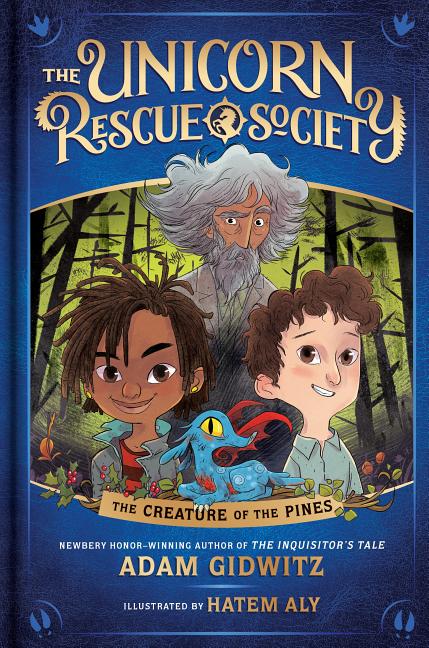From Teaching to Writing

TeachingBooks asks each author or illustrator to reflect on their journey from teaching to writing. Enjoy the following from Adam Gidwitz.
As a teacher, I remember walking down the long rows of library shelves with a third grader, desperately trying to find something that they wanted to read. I would take book after book off the shelf. “How about Charlie and the Chocolate Factory?” “I saw the movie.” “What about Maniac McGee?” “I don’t like the cover.” “Have you tried Junie B Jones?” “That’s for little kids.” “What about Harry Potter?” “My dad says I’m not ready for that.” I would begin to get desperate. “How about Dork Diaries? The Hobbit! Winn-Dixie!” And then I would just be throwing books at them. “Have you read E.B. White? Hemingway? Faulkner? What about the Bible? READ SOMETHING!”
Do you know what I mean?
Usually, as I was on the verge of tears, and there were screams coming from my classroom that I was too frightened to investigate—because at this point I’d been down the hall in the library helping this kid hunt for a book for about twenty minutes—I would say, “What kind of book DO you want to read?”
And they would almost always answer, “I want it to be funny, and exciting, and a series. Oh, and if it had animals in it, that would be good. Magical animals. Yeah.”
Now, many years later, I still have anxiety dreams about these library trips. But the dreams aren’t as bad as they used to be, because sometimes they end with me handing the kid a copy of a Unicorn Rescue Society Book.
I created the Unicorn Rescue Society to respond to this need that is very familiar to teachers.
But as I wrote the first books in the series, the needs it was responding to evolved.
The idea of the Unicorn Rescue Society, very simply, is that a couple of kids (Elliot and Uchenna) and their wildly unreliable mentor travel the world, rescuing mythical creatures from danger. The one creature that the Unicorn Rescue Society has never found, sadly, is a unicorn. But they will! One day! They’re pretty sure! As the U.R.S. travels the world, they learn not only about the mythical creatures of many different places and peoples, they learn about the cultures those creatures arise from—the food, the language, the customs. Which would be a bonus for teachers. A kid wants to learn something about the Basque country? Or Cuba? Or contemporary Native Americans? There’s no more fun way than to read a U.R.S. book!
Why don’t I ask some of the authors I admire most, who identify with different global cultures, to write these books with me?
And I began to wonder: Why don’t I ask some of the authors I admire most, who identify with different global cultures, to write these books with me? So that the books would be authentic, richer than anything I could come up with on my own. And I’ve been so honored to partner with legends like Joseph Bruchac; writers who have won truckloads of awards like David Bowles; rising stars like Emma Otheguy.
We write these books together, to ensure the whole series feels unified in one funny, exciting style—and yet is teaming with cultural learning. Learning that kids may not even notice. Because they’ll be too distracted by the giant dragon looming over them.
The books take on some serious issues. While being seriously funny. So Joe Bruchac, a member of the Abenake Tribe, wanted to show what a modern lifestyle is for Native Americans living on tribal lands. The point was not to show ancient Native American history, which gets lots of treatment, but what it might feel like if you sat down for a grilled salmon dinner with members of the Muckleshoot tribe in Washington State tomorrow night. Also, what it might feel like if those Muckleshoot tribe members took you out into the giant Sequoias of their land and introduced you to some Sasquatch, who then braided flowers in your hair. (Elliot was not pleased.)
I teamed up with David Bowles, a Mexican-American writer who lives right on the Texas-Mexico border, to write an adventure about those blood-sucking terrors known as chupacabras—that most popular of classroom bogeymen. (In my experience, in some parts of the country, chupacabras are at least as popular as unicorns.) Except, ours is a baby chupacabra, and he’s really cute. So it’s a fun romp through the arid regions just north of the Río Grandé. But it also deals with the strong feelings aroused by the border wall being built very nearby, honestly and warmly depicting people on both sides of the debate.
Everything I did was supposed to be truly fun—and also made us learn and grow as humans.
As a teacher, my mantra was “serious fun.” Everything I did was supposed to be truly fun—and also made us learn and grow as humans. That’s the mantra of The Unicorn Rescue Society, too. We’ll learn a lot. But we may not notice, because we’ll be having some serious fun.
Books and Resources

TeachingBooks personalizes connections to books and authors. Enjoy the following on Adam Gidwitz and the books he’s created.
Listen to Adam Gidwitz talking with TeachingBooks about the backstory for writing the Unicorn Rescue Society series. You can click the player below or experience the recording on TeachingBooks, where you can read along as you listen, and also translate the text to another language.
- Listen to Adam Gidwitz talk about his name
- Explore TeachingBooks’ collection of activities and resources for the Unicorn Rescue Society series
- Find an Audio Excerpt from the Unicorn Rescue Society series
- Discover Adam Gidwitz’s page and books on TeachingBooks
- Adam Gidwitz on his website, Instagram, Facebook, and Twitter.
Explore all of the For Teachers, By Teachers blog posts.
Special thanks to Adam Gidwitz and Penguin Books for Young Readers for their support of this post. All text and images are courtesy of Adam Gidwitz and Penguin Books for Young Readers, and may not be used without expressed written consent.



Leave a Reply